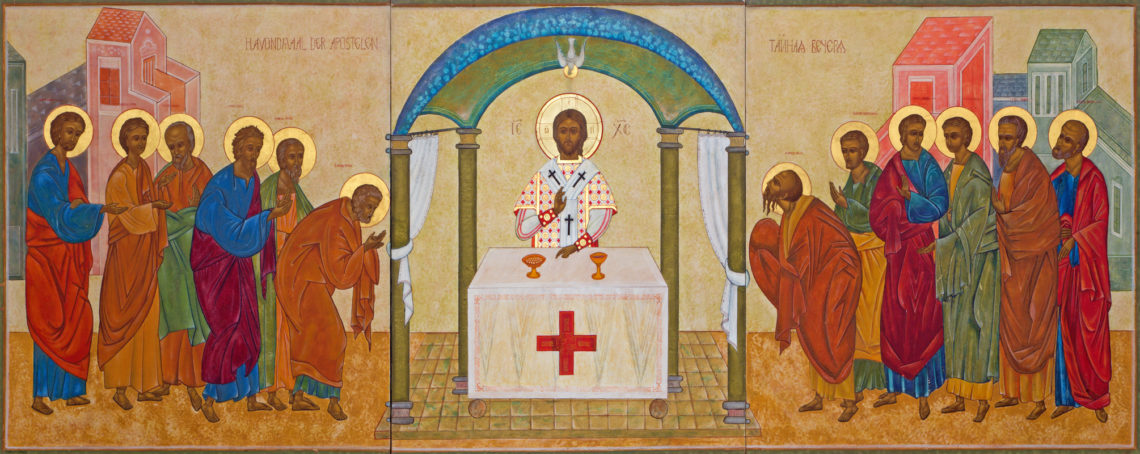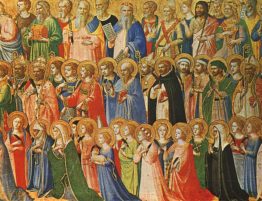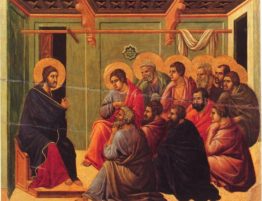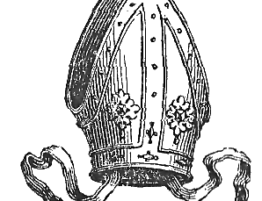
Most people consider their wedding day to be one of the grandest, most memorable, most important days of their lives. That certainly is my own experience. I remember my last meal as a single man (pizza, of course). I remember my best man furiously scouring the Internet for gluten-free cake options when after Heather got a call that the specialty cake shop had dropped the ball. I remember Ron, our late junior warden who is commemorated on the organ plaque, charming all the Albuquerque bridesmaids and crying throughout the service. I remember the nice ladies at Christ our King helping us with our boutonnieres. I remember Fr. Chip and Fr. Chuck sharing the service, as I was in the process of transferring from being a volunteer priest at Christ our King to become the assistant Rector here at All Saints. I remember all my clergy friends assisting as the acolytes, readers, and deacons. In fact, I still laugh about how then-Deacon Marcus had to give a new deacon from CoK an impromptu lesson on what to do when the wine runs out at Communion! And I am so very glad that so many All Saints folks were able to come with Heather and me to the Lord’s Table for our first Eucharist as a married couple.
Today’s Gospel is a parable about a wedding, much grander and fancier, and with much more drama than mine was! Please turn in your bibles to Matthew 22:1, found in your Prayer Book on Page 218.
Jesus said, The kingdom of heaven is like uno a certain king, which made a marriage for his son, and sent forth his servants to call them that were bidden to the wedding: and they would not come. Again, he sent forth other servants, saying, Tell them which are bidden, Behold I have prepared my dinner: my oxen and my failings are killed, and all things are ready: come unto the marriage. But they made light of it, and went their ways, one to his farm, another to his merchandise: and the remnant took his servants, and entreated them spitefully, and slew them. But when the king heard thereof, he was wroth: and he sent forth his armies, and destroyed those murderers, and burned up their city.
It’s been a few years, but the last time we had a royal wedding, the media could talk about nothing else for weeks before and after. Remember how many people in the US woke up at 4am to watch it on cable or YouTube? I remember folks setting up early morning parties to watch it together! Now, imagine being invited to the royal wedding and refusing to come. Not being unable to come, but simply refusing because you’d rather go to the office. And not only refusing to come, but violently harming the royal messengers who were sent to drive you to the wedding! This is, of course, the most audacious behavior. Even in our democracy where there is no royalty and the highest Office is theoretically open to all, no one who was invited to dine at the White House would refuse, even if they weren’t a supporter of that particular president.
This is, however, the exact state of most people with respect to Almighty God and our Lord Jesus Christ.
The first group of people, the initial group of invited guests, is meant to signify the chief priests, Pharisees, and elders of the people, according to the previous chapter. The Messiah had come to his own people, the people of Israel, but was rejected by their leaders. Those who should have been most ready to recognize him and receive refused to do so. Indeed, they led the majority of natural Israel with them. This was a pattern of rebellion that had already been established in the Old Testament. The servants that the wedding guests killed in the parable are almost certainly a symbol of the Old Testament Prophets, as well as Jesus’ own Apostles, who were similarly killed by those they to whom they had been sent. And according to the Gospels, the destruction of Jerusalem in 70 AD was the God’s Judgement for this rejection of the Gospel, in the same way that the destruction of Jerusalem at the hands of the Babylonians 700 years prior was Judgement for generations of idolatry and rejection of God.
But this is also a cautionary tale to you and me today. Being raised in the Church does not guarantee a living faith in King Jesus; it doesn’t not guarantee and citizenship in God’s Kingdom. There are many weeds sown among the grain. There are many baptized people who show no fruit of being born again. There are many who have partaken of the outward and visible sign of the Sacrament without receiving the inward and spiritual grace. And just as the Prophet Ezekiel saw the Presence of God leave the apostate Temple at the time of the Babylonian Exile, even so has God abandoned individuals and churches to their own apostacy and rebellion. We all can picture churches within our own beloved Anglican Communion that have abandoned the Gospel, perverted God’s Law, and are visibly devoid of God’s Spirit. They have become a mere shadow of their former selves, which is in itself evidence of God’s judgement. After all, what worse Judgement can there be than for God to leave us to our own destructive and foolish whims after we tasted his goodness?
But God’s judgement is also followed by mercy. Turn to verse 8 of our Gospel:
Then saith he to his servants, The wedding is ready, but they which were bidden were not worthy. Go ye therefore into the highways, and as many as ye shall find, bid to the marriage. So those servants went out into the highways, and gathered together all as many as they found, both bad and good: and the wedding was furnished with guests.
Now, this shows the general call of the Lord. God’s call is bigger than his original chosen people, bigger than those raised in the Church, born to Christian homes, or surrounded by a generally Christian society. Some of you here today are first-generation Christians. You were the first one in your family to accept the Gospel and follow Christ. Even if you were raised in the Church, chances are one of your ancestors was not, and you received the benefits of his or her conversion. This is why the doctrine of election from Ephesians 1 and our Articles of Religion, the idea that God chooses us before we can choose him, isn’t contrary to God’s grace. The same invitation is extended to all. St. Paul tells us in Romans 1 that even those who have not heard the Gospel overtly have witnesses to God’s greatness in all of creation. Philosopher Blaise Pascal described what has come to be called the “God-shaped hole” in everyone’s hearts. We all instinctively know there’s something bigger than ourselves, something ultimately good and righteous and just. And so, every Christian has the duty and privilege of sharing the Gospel with anyone. Often the person who appears to have the hardest of hearts is the one on whom the Holy Spirit has been working. Even in Scripture, we see that Saul of Tarsus, later known as St. Paul, was touched by Christ on the very road he was travelling to bring persecution by the Church!
Let’s continue with verse 11:
And when the king came in to see the guests, he saw there a man which had not on a wedding-garment: and he saith unto him, Friend, how camest thou in hither not having a wedding-garment? And he was speechless. Then said the king to the servants, Bind him hand and foot, and take him away, and cast him into outer darkness; there shall be weeping and gnashing of thee to. For many are called, but few are chosen.
This can be a terrifying passage. On the face of it, it seems that the man was handcuffed and kicked out of the wedding feast because he was underdressed. And if he was one of those from the main roads who came in, what if he was wearing his best, but his best wasn’t good enough? Well, most commentaries point out that it was typical in the ancient world for guests to be provided with a wedding garment, especially if the host was royalty or very wealthy. In other words, the man apparently rejected his host’s provided formalwear, and insisted on wearing his streetwear.
The Fathers tended to see the wedding garment as representing Christian love, called charity in the King James, based on the famous love passage from 1 Corinthians 13:
Though I speak with the tongues of men and of angels, and have not charity, I am become as a sounding brass or a tinkling cymbal. And though I have the gift of prophecy, and understand all mysteries, and all knowledge; and though I have all faith, so that I could remove mountains, and have not charity, I am nothing. And though I bestow all my goods to feed the poor, and though I give my body to be burned, and have not charity, it profiteth me nothing.
The Reformers tended to see the wedding garment as representing Christ’s righteousness, given to us by God when we are justified by faith. That is, the man without a wedding garment was trusting in his own righteousness to make him worthy of God’s presence rather than Christ’s. When we remember that all of our good works, especially that greatest work of Christian love, are the fruit of that justification, we see that the Fathers and Reformers really speak of two sides of the same coin. If you have not been justified by Christ’s righteousness, you will have no genuine good works, you will not love God or your neighbor.
This is why St. Paul says, “Examine yourselves, to see whether you are in the faith. Test yourselves. Or do you not realize this about yourselves, that Jesus Christ is in you? – unless indeed you fail to meet the test!” (2 Corinthians 13:5). This is why St. Peter says, “Therefore, brothers, be all the more diligent to conform your calling and election, for if you practice these qualities you will never fall. For in this way there will be richly provided for you an entrance into the eternal kingdom of our Lord and Savior Jesus Christ” (2 Peter 1:10-11).
Whenever you find yourself doubting your faith, doubting whether God has indeed invited you to the marriage supper of the Lamb, the proper response is repentance. First, repent of doubting God’s promise expressed to you in your baptism. Second, repent of whatever sins are causing you to be distant from God to the point that your faith is in question.
Remember John 3:16, one of the most well-known memory verses, and one of our Comfortable Words in our Communion Liturgy: “So God loved the world, that he gave his only-begotten Son, to the end that all that believe in him should not perish, but have everlasting life.” Are you part of the world? Then God loved you enough to send his Son for you. The fact that you’re thinking about this is evidence that you belong to Him.
And then come to the Feast. Ultimately, we look forward to the Wedding Feast of the Lamb, when the Church is presented to Christ as his spotless bride, and all is set to rights in a renewed Heaven and Earth. And in the meantime, we have the Paschal Feast at the Lord’s Table every Sunday. We have Communion with our Lord and with each other, we have the Sacrament that feeds us with the Lord himself. As Bishop, Reformer, and Martyr Hugh Latimer said, “Now what manner of meat was prepared at this great feast? … Marry, it was the bridegroom himself: for the Father, the feast-maker, prepared none other manner of meat for the guests, but the body and blood of his own natural Son.” Beloved, taste and see that the Lord is good, clothed in his righteousness and love.
In the Name of the Father, and of the Son, and of the Holy Ghost. Amen.







